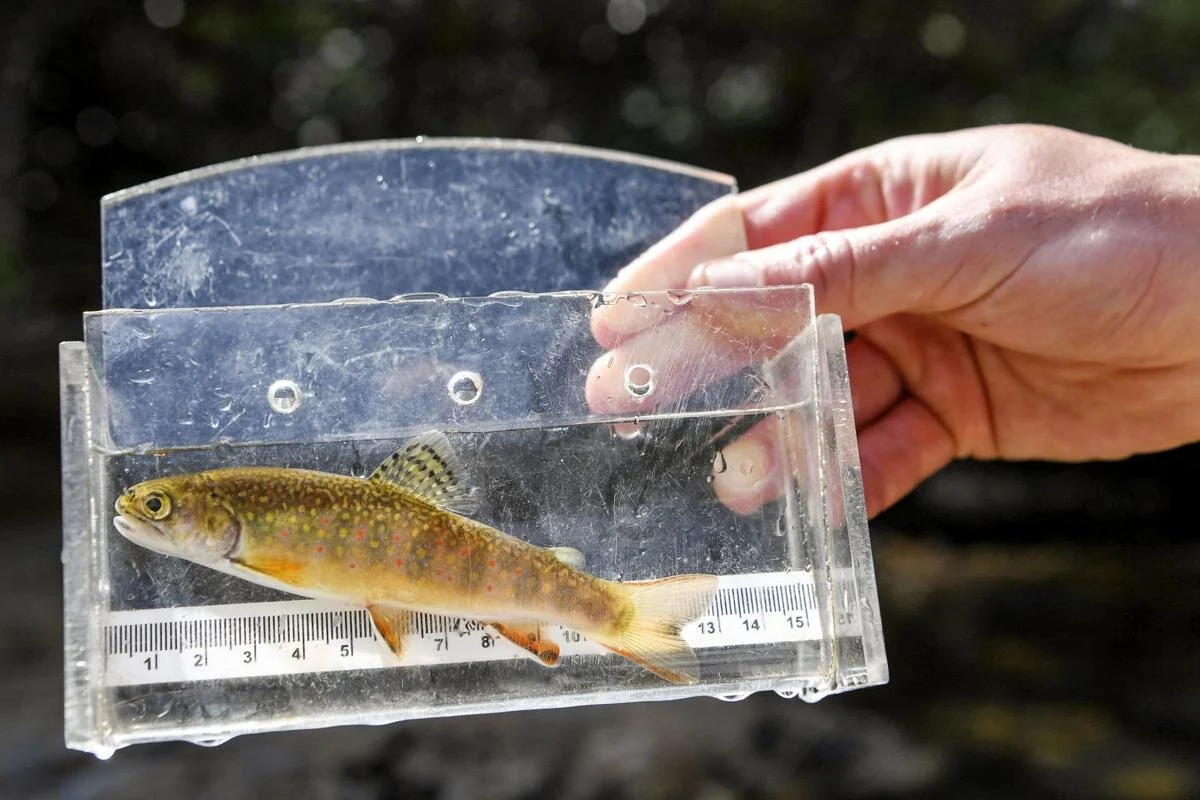Photo: Brook Trout, Angela Wilhelm/The Asheville Citizen-Times via The Associated Press
On December 9, the Richmond Times-Dispatch published an op-ed article by ASNV President Tom Blackburn urging Virginia members of the U.S. House of Representatives to co-sponsor the Recovering America’s Wildlife Act, H.R. 3742. The bill would provide $1.4 billion a year in new funding to prevent wildlife from becoming endangered. The funds would go to every state in the nation to support on-the-ground habitat protection, scientific research and wildlife restoration. Tom’s article pointed out the importance of protecting wildlife to reduce disruptions to the nation’s ecosystems and the emotional benefits that we all derive from being able to interact with nature.
From the Richmond Times-Dispatch
Support for the Recovering America's Wildlife Act helps everyone
By Tom Blackburn
Virginia’s outdoor heritage is vitally important. Our Virginia congressional delegation joined a bipartisan majority in recently enacting legislation to shore up our nation’s threatened natural resources by fully funding the Land and Water Conservation Fund.
We urge them to take the additional step of joining U.S. Rep. Rob Wittman, R-1st, in co-sponsoring the Recovering America’s Wildlife Act (H.R. 3742). Support for this legislation is vitally important to protecting and supporting wildlife.
Whether it’s the squirrel in your backyard or a black bear in Virginia’s Blue Ridge Mountains, wildlife plays a critical role in our shared environment. Diversity in animal life helps to maintain nature’s equilibrium.
However, we should not take wildlife for granted. The Virginia Department of Wildlife Resources has identified 883 wildlife species as in decline — “of greatest conservation need” — and has designated 136 of those species as threatened or endangered. Some of Virginia’s most iconic wildlife, like the brook trout, the northern bobwhite quail and the Shenandoah salamander, are imperiled.
The brook trout, among Virginia's most iconic wildlife, has been identified by the Virginia Department of Wildlife Resources as one of 883 species "of greatest conservation need."
Photo: Angela Wilhelm/The Asheville Citizen-Times via The Associated Press
Wildlife and our natural environment provide us a place of reassurance and solace. Health professionals recognize that even a few minutes outdoors can recharge our spirits. Getting outdoors for some bird-watching, kayaking or a walk in a local park can help all of us get through tough times. In the past several months, millions of people turned to our parks and open spaces for respite from the pressures of the pandemic.
There is bipartisan support for wildlife and nature. During a year of political gridlock, our federal elected officials have accomplished some real wins for conservation in 2020.
The Great American Outdoors Act provides billions of dollars in funding for the preservation of natural places, recreational areas and wildlife habitat, along with billions to fund maintenance improvements in our national parks.
The American Conservation Enhancement Act creates new federal programs to protect wetlands, clean up the Chesapeake Bay and tackle wildlife diseases, among other measures. Both bills passed with overwhelming bipartisan support. The new laws will have a great impact on wildlife and habitat for decades ahead.
There is another great conservation bill out there that can bring us together: the Recovering America’s Wildlife Act (H.R. 3742). This bill would provide $1.4 billion a year in new funding to prevent wildlife from becoming endangered. The funds would go to every state in the nation to support on-the-ground habitat protection, scientific research and wildlife restoration. In Virginia, the funds would help the Department of Wildlife Resources take action to protect and restore some our most iconic — and imperiled — fish and wildlife.
Protecting our nation’s wildlife is important to us in several ways. The loss of 3 billion birds — 29% of the population of North American birds — in the past 50 years, as documented in Science magazine in September 2019, is evidence of the profound disruption to our country’s ecosystems. Declines and extinctions in one species can have a domino effect that leads to harm to other species, as the natural food web becomes damaged. We need to protect and restore wildlife by rehabilitating the ecosystems that support them.
Restoring wildlife also will contribute to our personal well-being. Wildlife can provide countless hours of enjoyment. Watching a brook trout leap for a fly, catching a glimpse of a red fox as it slips into the underbrush and spying a scarlet tanager high in the tree canopy can give us a sense of wonder and peace that cannot be replaced by the sterile world of the internet and television.
Saving wildlife has economic implications, too. Outdoor recreation generates $18 billion in economic activity a year in Virginia. Wildlife watching supports more than 23,000 Virginia jobs. Investing in wildlife is both an environmental and an economic investment.
Tom Blackburn, ASNV President. Photo: Brenda Blackburn
The Recovering America’s Wildlife Act has 185 co-sponsors in the House of Representatives. However, only one Virginia representative is a co-sponsor: Wittman.
We urge all Virginia members of the House of Representatives to join him in this bipartisan effort and co-sponsor the Recovering America’s Wildlife Act. By supporting this bill, they can show us that they can work together and help heal both our natural and political landscapes.



